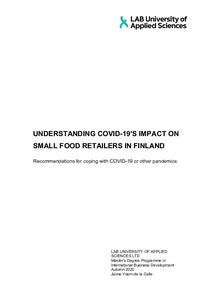Understanding COVID-19’s impact on small food retailers in Finland : Recommendations for coping with COVID-19 or other pandemics
Ysern De La Calle, Jaime (2020)
Ysern De La Calle, Jaime
2020
Julkaisun pysyvä osoite on
https://urn.fi/URN:NBN:fi:amk-2020092820757
https://urn.fi/URN:NBN:fi:amk-2020092820757
Tiivistelmä
Small, independent food retailers in Finland are trying to adapt their business models to cope with the current COVID-19 crisis. This thesis aims to explore the topic in detail and present up-to-date evidence to aid these small businesses' decision-making process and help them pivot in the right direction.
A mixed methods research design was chosen to conduct the study and answer the main research question: What business model changes are essential for Finnish small food retailers to survive the ongoing COVID-19 crisis or future pandemics? Firstly, qualitative data were collected by interviewing ten business owners to understand their response to the COVID-19 crisis and explore how they modified their business models. Secondly, quantitative research was conducted by surveying 102 customers that typically buy from these businesses to evaluate their behavior and engagement during the pandemic.
From a business model standpoint, the findings showed that the pandemic has changed primarily how businesses reach and communicate with their customers. Digitalization drives the major changes and is responsible for the loss of importance of traditional channels like, for example, the brick-and-mortar store. Further, the pandemic and consequent shift to digitalization can also bring changes to the cost structure, provide new revenue streams, or
even uncover a new customer base. The findings also revealed that entrepreneurs had some good ideas to tackle the crisis, but these were poorly executed in many cases. The results were also crucial to understanding the importance of adequate strategic planning in a fast-changing business landscape.
Based on the research findings, a series of recommendations are developed. As a whole, the recommendations provide a comprehensive look at the specific business model adjustments necessary to master the pivot and thrive during a pandemic, thus providing the real answer to the research question. Nonetheless, the essential business model changes are different for each company—each business owner must look at the recommendations and decide which ones fit better their situation, strategy, or goals.
A mixed methods research design was chosen to conduct the study and answer the main research question: What business model changes are essential for Finnish small food retailers to survive the ongoing COVID-19 crisis or future pandemics? Firstly, qualitative data were collected by interviewing ten business owners to understand their response to the COVID-19 crisis and explore how they modified their business models. Secondly, quantitative research was conducted by surveying 102 customers that typically buy from these businesses to evaluate their behavior and engagement during the pandemic.
From a business model standpoint, the findings showed that the pandemic has changed primarily how businesses reach and communicate with their customers. Digitalization drives the major changes and is responsible for the loss of importance of traditional channels like, for example, the brick-and-mortar store. Further, the pandemic and consequent shift to digitalization can also bring changes to the cost structure, provide new revenue streams, or
even uncover a new customer base. The findings also revealed that entrepreneurs had some good ideas to tackle the crisis, but these were poorly executed in many cases. The results were also crucial to understanding the importance of adequate strategic planning in a fast-changing business landscape.
Based on the research findings, a series of recommendations are developed. As a whole, the recommendations provide a comprehensive look at the specific business model adjustments necessary to master the pivot and thrive during a pandemic, thus providing the real answer to the research question. Nonetheless, the essential business model changes are different for each company—each business owner must look at the recommendations and decide which ones fit better their situation, strategy, or goals.
